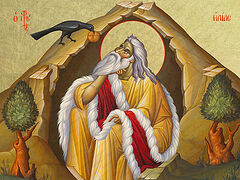 Photo: bigenc.ru Elias was a man subject to like passions as we are, and he prayed earnestly that it might not rain: and it rained not on the earth by the space of three years and six months. And he prayed again, and the heaven gave rain, and the earth brought forth her fruit (Jas. 5:17–18).
Photo: bigenc.ru Elias was a man subject to like passions as we are, and he prayed earnestly that it might not rain: and it rained not on the earth by the space of three years and six months. And he prayed again, and the heaven gave rain, and the earth brought forth her fruit (Jas. 5:17–18).
Isn’t it amazing, brothers, that a man of like passions as we are can command the heavens to give rain, and the earth to bring forth its fruits? Who today would believe that a man could have such strength of spirit that could conquer even the elements? Who has such strength of spirit that they could completely place all their hope in God, always remain faithful to Him in life, and never seek to please people? Such a man was the great and glorious prophet of Israel, Elias. Filled with fiery zeal for the God of Israel, he departed from human society that had betrayed its God, feeds on the food that a raven brings him, and drinks water from the rocks. But even in his seclusion he never ceases to burn with the spirit of zeal from his fiery desire to purge Israel of is unrighteousness. He was, through his prayer, truly a “chariot of Israel and the horses thereof” (4 Kings 2:12 LX).
His prayer was the fortress of Israel, saving it from its enemies, preserving in it its ever-waning faith in the true God and guarding it from the impiety of the neighboring pagan peoples.
Why then, brothers, if Elias was a man of like passions as we are, do we not now see anyone with such a spirit? Why then do none of those people who have come to know and believe in Christ, for Whom Elias would be, according to the Church’s belief, only a forerunner at the Lord’s Second Coming to earth, have such strong faith and fiery zeal for God as St. Elias had? Undoubtedly, it is because the earth has as if grown old in its sins and passions in which it lives, and the further goes the time, the more people lose their strength of will, and can no longer direct it towards good deeds as before. Just as a person who has lived for many years can hardly change the habits that have taken root in him with insurmountable strength over the course of many years, so also the world, which has existed many centuries without the sincere desire to please God, is becoming more and more incapable of believing in Him and loving Him. I am come to send fire upon the earth (Lk. 12:49), says the Lord—that is, fiery zeal for the fulfillment of God’s will, as He said about Himself through the prophet: I have desired to do Thy will, O my God, and Thy law amidst my bowels (Ps. 39:9). And so we now see that this fire is burning ever more feebly in a world grown old in its passions, and that people’s hearts increasingly, as in old age, cool towards love of God and His Kingdom being created amidst His people. Isn’t this why Elias, filled with fiery zeal for God was taken up alive into heaven and will come back to the earth at the end of time—in order to ignite again in people the dying flame of love for God, thus preparing them for the coming Judgment of the whole world?
However, it is not the miraculous power of Elias’s faith, by which he brought down fire to earth and resurrected the dead, that the world needs now. For, according to the word of the Savior, we should not rejoice even when the demons obey us, but rather when our names are “written in heaven” (Lk. 10:20). We should not desire that majestic fire be brought down to earth, but rather that our souls be ignited by the unknown, miraculous fire of Divine grace. Once, in his zeal for the Almighty God Whom Israel had forsaken, Elias withdrew to the wilderness and grieved. But God appeared to him not in the storm, nor in the fire, nor in the earthquake, but in the gentle whisper of the wind (1 Kings 19:11-12). It is this gentle whisper of Divine grace that we should also desire for ourselves, so that it may imperceptibly build the Kingdom of God within our souls.
And if in the Kingdom of God, according to the words of the Savior, even the “least” in terms of the gifts of grace is greater than “the greatest among those born of women,” John the Baptist (Matt. 11:11), then even now, more wondrous deeds than all those performed by St. Elias can take place in our souls (Jn. 14:12). If we cannot have such strong and miracle-working faith as Elias had, then let us at least preserve and increase our faith in the reality that grace can preserve our souls from the strongest and most alluring passions, provided that we fight it with the hope of the grace given to us. Then, even Elias, who closed the heavens and reopened them with his prayer, while remaining a weak and frail man like us, will not condemn us on the day of Christ's Second Coming but will, by his prayer, open the doors of the “new heaven” that shall appear—that we may enter there and “recline in the Kingdom of Heaven” with all the righteous who came before us. Amen.



